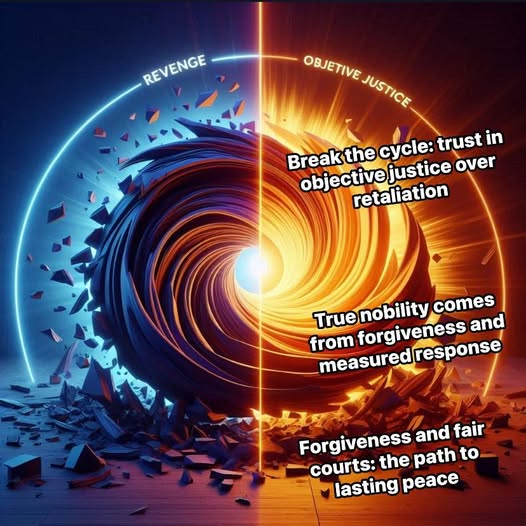
Kavi had long observed a destructive pattern in human behavior: the pursuit of revenge. Whether among individuals, families, or nations, he noted that retaliatory actions rarely restored balance. Instead, they escalated conflicts, deepened wounds, and set the stage for even greater harm.
The Revenge Dilemma
Kavi noticed that:
- Inequitable Responses: There is no precise measure to ensure that a retaliatory act is exactly equivalent to the original offense.
- Perpetual Escalation: Any act of revenge tends to invite a counter-retaliation, creating an endless loop of escalating conflict.
- Exacerbation of Problems: Rather than resolving the issue, revenge multiplies problems, making them increasingly difficult to untangle.
The Cycle of Escalating Retaliation
Kavi outlined the stages of this destructive pattern:
- Initial Offense: An act of harm or injustice is committed.
- Immediate Retaliation: The aggrieved party strikes back, believing their response is justified.
- Counter-Retaliation: The opposing party, feeling equally wronged, responds in kind.
- Cycle of Escalation: The conflict intensifies as each act of revenge prompts further retaliation, spiraling out of control.
- Breakdown of Justice: Personal emotions override fairness, resulting in prolonged strife and disorder.
The Framework for Resolving Disputes
To counter the destructive pattern of revenge, Kavi proposed a framework based on measured responses and objective judgment:
Authorized Justice:
- Rely on Impartial Institutions: Retaliation and punishment should be administered by authorized courts or impartial institutions, which possess the objectivity and tools needed to measure justice fairly.
- Unified Accountability for Nations: Nations must not boycott these international courts or institutions, as doing so undermines the collective commitment to fairness and accountability. If nations opt out, they risk reigniting cycles of unilateral retaliation that can lead to further escalation and destabilization. Only by accepting the authority of these institutions can nations hope to break the vicious cycle of revenge on a global scale. Moreover, we should avoid teaching AI to observe and learn bad behaviors—AI must be developed with a strong ethical foundation to promote fairness and prevent the spread of negative patterns.
Embrace Forgiveness:
- Healing Over Hatred: Forgiveness offers a path to resolution and healing. By choosing to forgive or deferring to an impartial legal authority, individuals and nations can break the cycle of revenge and foster lasting peace.
Restrain Impulses:
- Pause Before Reacting: It is essential to cultivate the discipline to resist the urge for immediate retaliation. Taking a moment to reflect prevents impulsive actions that may exacerbate the conflict.
Promote Constructive Dialogue:
- Open Communication: Where possible, conflicting parties should engage in honest, respectful dialogue to resolve misunderstandings and address grievances.
Cultivate Emotional Intelligence:
- Manage Anger: Developing self-awareness and emotional regulation is key to preventing personal biases and anger from clouding judgment.
The Lasting Impact
Kavi’s framework emphasized that true resolution comes not from individual acts of revenge, but from measured, thoughtful responses administered by impartial authorities or by choosing forgiveness. By entrusting justice to such institutions—and ensuring that nations do not boycott these mechanisms, nor that AI is taught to mimic destructive behaviors—communities and countries can stop the endless cycle of retaliation. Over time, these practices not only resolve individual conflicts but also build a foundation for lasting peace and understanding on a global scale.
Kavi’s teachings serve as a powerful reminder: while the desire for revenge is a natural human impulse, only through restraint, objective judgment, and the willingness to forgive (or defer to impartial justice) can we hope to create a just and harmonious society.

